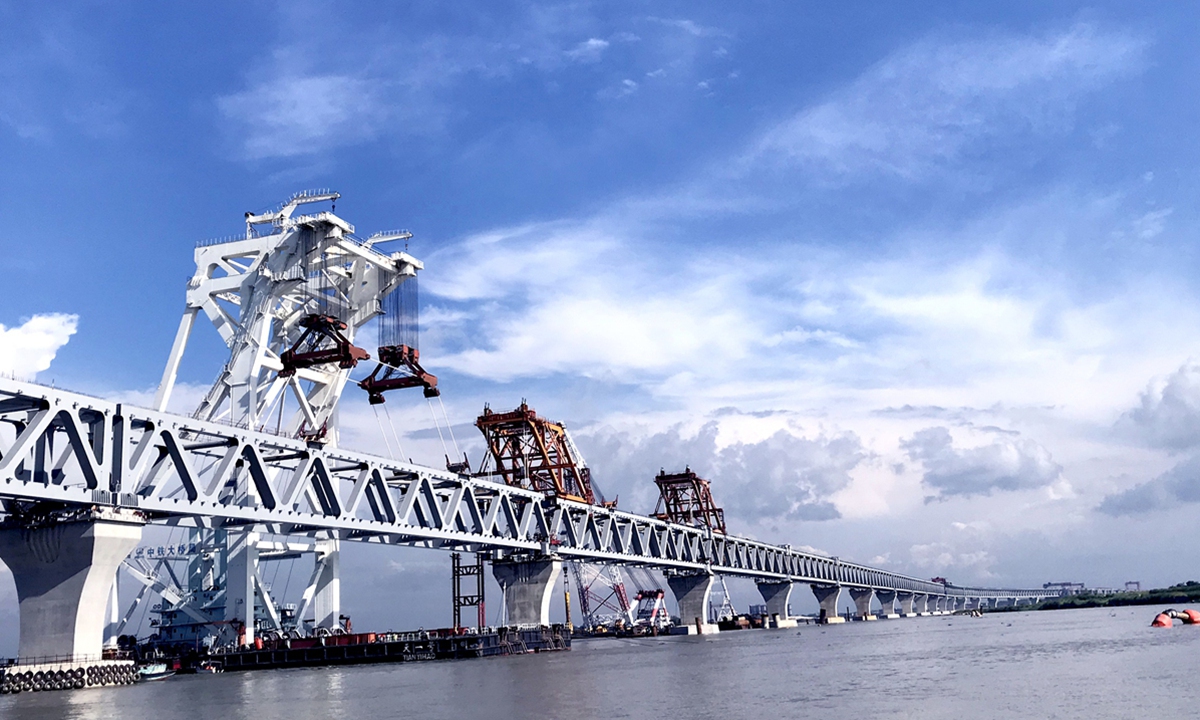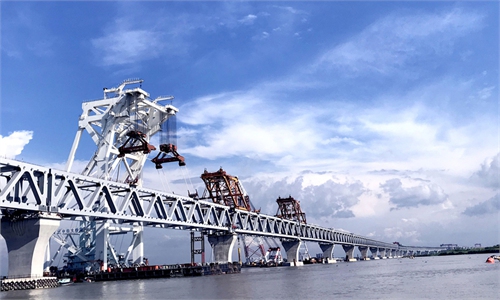China-Bangladesh cooperation can’t be stopped by opposition from hegemonic powers

The Chinese-built Padma Bridge Project is Bangladesh's largest bridge project. Photo: Xinhua
At the invitation of Chinese Premier Li Qiang of the State Council, Bangladeshi Prime Minister Sheikh Hasina visited China from July 8 to 10. This was her first visit to China after being re-elected. Chinese leaders attached great importance to Hasina's visit. Through a series of meetings, the leaders of China and Bangladesh exchanged views in a warm and friendly atmosphere on bilateral relations and international regional issues of common concern, reaching broad consensus and jointly issuing the "Joint Statement between China, Bangladesh on the Establishment of Comprehensive Strategic Cooperative Partnership." This marks a new height in the development of the relationship between the two countries since the establishment of a strategic cooperative partnership in 2016.From the joint statement, it's evident that the China-Bangladesh relationship is a model of mutual understanding, mutual support, equality, mutual benefit, and win-win cooperation between two "Global South" countries. The "Global South" is not just an economic concept, but also a political and civilization concept that excludes developed Western countries. Despite attempts by some Western countries to exclude China from the Global South based on so-called per capita GDP, the strong friendship formed between China and other Global South countries in the fight for a new international political and economic order over the past few decades will remain unchanged. As political, economic, social, and cultural ties between China and these countries continue to develop, this friendship will deepen further. This friendship is exemplified in the China-Bangladesh relationship.
As a developing major country that has made significant progress through arduous reforms and opening-up, China understands the development, regional, and global challenges faced by Bangladesh. China is committed to helping Bangladesh overcome its current difficulties to the best of its ability, based on mutual understanding, accommodation, and mutual benefits. China's approach stands in stark contrast to that of some major powers who prioritize their own development without considering the well-being of others, engage in power politics against weaker neighboring countries for selfish gain or use water issues as a means of control.
Hasina visited India twice before she came to China. Hasina attended the swearing-in ceremony of Indian Prime Minister Narendra Modi's third term with her daughter. Then, on June 21 to 22, she made a state visit to India. Hasina is the first foreign leader to make a state visit to India after Modi's third term began. The visit to India was arranged before the official visit to China, showing the careful and meticulous planning of the Bangladeshi government and Hasina herself in terms of diplomacy. Bangladesh maintains a balanced diplomacy, with its officials often emphasizing India as a "political friend" and China as a "development friend."
China has contributed to many development projects in Bangladesh, helping the country achieve its economic goals. Over the past few decades, especially since the launch of the China-proposed Belt and Road Initiative, Bangladesh has experienced the benefits of cooperation with China. Infrastructure projects such as the Padma Bridge, Bangabandhu Sheikh Mujibur Rahman Tunnel, and Dasherkandi sewage treatment plant have helped address bottlenecks in Bangladesh's economic and social development, marking a significant achievement for the Hasina government. China has become Bangladesh's largest trading partner, with a large number of Chinese industries transferring to Bangladesh. The nearly 1,000 Chinese companies operating in Bangladesh today have helped create more than 550,000 job opportunities.
China has also collaborated closely with Bangladesh on various issues including climate change, agricultural development, water and drought disaster management, environmental protection, blue economy, digital economy, and human resource training. The joint statement reflects China's commitment to providing strong support to Bangladesh across all aspects of its economic and social development, as well as addressing bilateral and multilateral concerns. These cooperative efforts and China's goodwill lay a solid foundation for the establishment of a Comprehensive Strategic Cooperative Partnership between China and Bangladesh.
China also understands that although Bangladesh hopes to deepen and strengthen cooperation with China, it is limited by international and regional geopolitical factors. In fact, not only Bangladesh, but almost all small countries in South Asia and the Indian Ocean region face restraints in their economic and social development cooperation with China. The governments and elites of these countries also recognize this issue. Cooperation with China can bring economic and social development to them, and China never interferes in their internal affairs, so they are eager to cooperate with China. However, overly close economic and social cooperation with China may provoke opposition from some hegemonic countries, thereby affecting their "political security" and regime stability. In a sense, the contradiction between the economic and social development of small countries in South Asia and their "political security" and "regime stability" can only be resolved by the unity of political forces in these countries. This is the fundamental reason for the emergence of the "India out" campaign in small countries in South Asia in recent years.
The people of South Asia are all striving for a better life and faster, higher-quality economic and social development. China has the ability to support the economic and social development of these countries. Next year marks the 50th anniversary of the establishment of diplomatic relations between China and Bangladesh, and the two countries will take the opportunity to celebrate this milestone and elevate their relationship to a new level. The closer economic and social development cooperation between China and small countries in South Asia and the Indian Ocean region, including Bangladesh, is a trend that cannot be stopped by any opposing forces.
The author is director of the Center for South Asia Studies at the Shanghai Institutes for International Studies. opinion@globaltimes.com.cn



